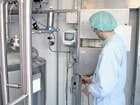Migrating an agrochemical producer’s existing installed base of pH analyzers to Endress+Hauser’s Memosens and Liquiline technology platforms increased pH data reliability, decreased downtime and increased production, according to the company. Savings were realized: Specifically, maintenance labor was reduced by 50% and consumable usage was cut by 60%, producing savings of more than $450,000 per year.
The agricultural chemical manufacturer produces and supplies agrochemicals for worldwide markets. The manufacturing plant uses pH measurements to monitor and control reactions at more than 30 locations in utilities, incinerators, scrubber effluents, pH quench tanks and wastewater final effluents. Additional pH measurement and control locations are used in chemical synthesis reactors on recirculation lines to confirm and/or control pH for chemical synthesis.
Depending on the criticality of processes, some pH measurements required closer attention and more maintenance than others. For example, the 80 units installed in the phosphatization and sulfonation processes required calibrations twice a week. Typically these calibrations required about 45 minutes to perform, resulting in approximately 120 hours per week or 6,240 hours each year to maintain calibration.
The agrochemical producer made immediate improvements by replacing existing pH electrodes with Endress+Hauser Memosens pH electrodes with Teflon reference junctions. Included with the new electrode were a new electrode holder and cabling technologies that eliminated previous reliability problems, such as poor connections and resulting electrical faults.
The Liquiline platform that supports electrode lab calibration away from the field was also installed. With the use of this platform, the customer was able to rotate electrodes every two weeks with pre-calibrated electrodes. These electrodes also lasted longer: several months as opposed to a few weeks.
The Liquiline platform extends to the lab, so calibration no longer needs to be performed in the field. Electrodes can now be continually cleaned, calibrated and even regenerated under controlled conditions in the lab. As a result, technicians can replace installed electrodes with calibrated ones in a fraction of the time, according to Endress+Hauser.
Endress+Hauser‘s Memosens technology increased the plant’s average usage per electrode from 748 hours to more than 2,500 hours. With these changes in place, yearly maintenance hours decreased from 6,240 to 3,200, for a net saving of 3,040 hours. Through proper electrode, holder and cabling selection and the use of Memosens and Liquiline technologies, the customer saved more than $450,000 per year in labor and materials to maintain its pH systems.
Source: Endress+Hauser


